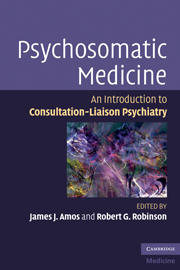Book contents
- Psychosomatic Medicine
- Psychosomatic Medicine
- Copyright page
- Dedication
- Contents
- Preface
- Acknowledgements
- Contributors
- Chapter 1 The consultation process
- Chapter 2 Assessing capacity in the medically ill: I don't want to!
- Chapter 3 The difficult patient encounter: understanding what just happened
- Chapter 4 Psychopharmacology in the medically ill
- Chapter 5 Suicide risk assessment
- Chapter 6 Assessment and management of the violent patient
- Chapter 7 Evaluation and management of delirium
- Chapter 8 Management of somatoform disorders
- Chapter 9 Managing factitious disorder and malingering
- Chapter 10 Agitation in patients with dementia
- Chapter 11 Depression and heart disease
- Chapter 12 Management of post-stroke depression
- Chapter 13 Psychiatric aspects of Parkinson's disease
- Chapter 14 Managing depression in traumatic brain injury
- Chapter 15 Managing psychiatric aspects of seizure disorders
- Chapter 16 Distress and depression in cancer care
- Chapter 17 Depression in the patient with hepatitis C
- Chapter 18 Psychiatric aspects of AIDS
- Chapter 19 Managing depression and renal failure
- Chapter 20 Management of psychiatric syndromes due to endocrine and metabolic diseases
- Chapter 21 Management of alcohol withdrawal and other selected substance withdrawal issues
- Chapter 22 Managing depression in pregnancy
- Chapter 23 Psychiatric aspects of organ transplantation
- Chapter 24 Preoperative psychiatric evaluation for bariatric surgery
- Chapter 25 Psychiatric care at the end of life: hospice and palliative medicine
- Chapter 26 Demoralization in the medical setting
- Chapter 27 Psychotherapy for the hospitalized medically ill patient
- Chapter 28 Children’s reactions and consequences of illness and hospitalization and transition of care from pediatric to adult settings
- Index
Chapter 2 - Assessing capacity in the medically ill: I don't want to!
Published online by Cambridge University Press: 04 August 2010
- Psychosomatic Medicine
- Psychosomatic Medicine
- Copyright page
- Dedication
- Contents
- Preface
- Acknowledgements
- Contributors
- Chapter 1 The consultation process
- Chapter 2 Assessing capacity in the medically ill: I don't want to!
- Chapter 3 The difficult patient encounter: understanding what just happened
- Chapter 4 Psychopharmacology in the medically ill
- Chapter 5 Suicide risk assessment
- Chapter 6 Assessment and management of the violent patient
- Chapter 7 Evaluation and management of delirium
- Chapter 8 Management of somatoform disorders
- Chapter 9 Managing factitious disorder and malingering
- Chapter 10 Agitation in patients with dementia
- Chapter 11 Depression and heart disease
- Chapter 12 Management of post-stroke depression
- Chapter 13 Psychiatric aspects of Parkinson's disease
- Chapter 14 Managing depression in traumatic brain injury
- Chapter 15 Managing psychiatric aspects of seizure disorders
- Chapter 16 Distress and depression in cancer care
- Chapter 17 Depression in the patient with hepatitis C
- Chapter 18 Psychiatric aspects of AIDS
- Chapter 19 Managing depression and renal failure
- Chapter 20 Management of psychiatric syndromes due to endocrine and metabolic diseases
- Chapter 21 Management of alcohol withdrawal and other selected substance withdrawal issues
- Chapter 22 Managing depression in pregnancy
- Chapter 23 Psychiatric aspects of organ transplantation
- Chapter 24 Preoperative psychiatric evaluation for bariatric surgery
- Chapter 25 Psychiatric care at the end of life: hospice and palliative medicine
- Chapter 26 Demoralization in the medical setting
- Chapter 27 Psychotherapy for the hospitalized medically ill patient
- Chapter 28 Children’s reactions and consequences of illness and hospitalization and transition of care from pediatric to adult settings
- Index
Summary
- Type
- Chapter
- Information
- Psychosomatic MedicineAn Introduction to Consultation-Liaison Psychiatry, pp. 15 - 21Publisher: Cambridge University PressPrint publication year: 2010
- 1
- Cited by



